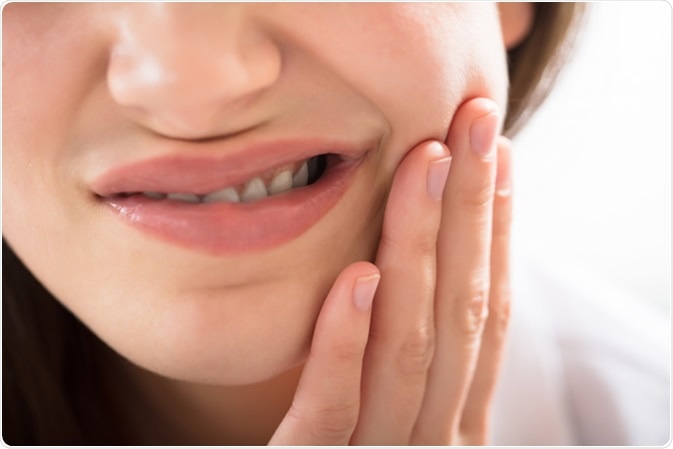
Teeth/Dentinal Hypersensitivity: Causes, Treatment
Dentinal Hypersensitivity refers to that highly sensitive teeth that does not allow you to take your favorite ice cream or hot rice. There are some persons that their teeth’s are unusually very sensitive to common substances that we eat or drink everyday, or to normal temperatures. This form of increased sensitivity of the teeth is known as Dentinal Hypersensitivity. Teeth sensitivity can affect one, two or the whole teeth, it can be temporary or chronic.
To put it simply, Just imagine that you are out on the hot lagos sun, and you think that getting a giant coldstone or Vanilla ice cream would be just perfect. You rush to the nearby Shoprite or Roban store, pick your favorite flavor, about to enjoy it but then hesitate, you know that if you put that cold ice-cream into your mouth, it would send an electric shock down your entire body. This is what we refer to as a hypersensitive teeth, and these type of dental condition is more common that people think.
What is Dentinal Hypersensitivity?
Dentinal/Teeth Hypersensitivity simply means when a substance that ordinarily should not cause pain to your teeth starts causing you pain, eg when you eat pineapple you start having a shocking sensation/pain.
Also, just as the name sounds, it is like a Pain or discomfort in the teeth as a result of certain stimuli such as cold or hot temperatures, which ordinarily does not cause pain or discomfort in a healthy teeth.
Why will a teeth become sensitive?
Ordinarily tooth is covered by a very hard substance known as enamel. This is the hardest substance in the body, and it is the outer covering of the tooth. Under this enamel is the dentine, and this dentinal layer is the part of the teeth that contains all the nerve endings (like a satellite receiver) which carries the stimulus (signal) from the teeth to the brain.
Whenever the enamel erodes or wears off, this dentinal layer that contains all the nerves (receiver) will become more exposed to the substances (food or temperature) that we put in our mouth, making the tooth to become more sensitive. This is what is known as Dentinal Hypersensitivity.
How do I know if my teeth is hypersensitive?
When you start feeling pain or discomfort with any of the following;
- hot foods and beverages
- cold foods
- cold air or trying to smile under fan
- Acidic food such as pineapple
- cold water
- sweet foods and beverages
- brushing and flossing
- alcohol based mouth rinse
Then you should suspect Dentinal Hypersensitivity.

Although Some of these pain can also be due to tooth decay, dental carries or cavity, that’s why you need to see a dentist. You can read more about Tooth decay here.
Causes of Dentinal Hypersensitivity
Some causes of Dentinal Hypersensitivity includes;
A. Brushing vigorously: Brushing teeth with hard bristle can wear off the outer surface of the teeth (enamel) leading to increased sensitivity.
B. Grinding your teeth at night: although enamel is the strongest substance in our body, grinding the teeth too much can weaken the enamel, it will wear off and expose the inner layer Dentine which is sensitive.
C. Taking excessive acidic food: too much consumption of acidic food or beverages like Soda, processed foods, Citrus, etc can cause the enamel of your teeth to wear down over time.
D. Overuse of mouthwash: different types of mouthwash available in the market have been known to contain a huge quantity of acidic content, alcohol and other chemicals. When this is used too much, it can dissolve the enamel over time causing increased sensitivity.
E. Tooth decay, broken and chipped tooth, even worn out fillings or crowns can expose the dentinal layer, in this case the sensitivity will be on that particular tooth.
F. Gum recession: this can leave some section of the teeth (especially around the root) exposed and cause increased sensitivity.
G. Some systemic diseases like Gastroseophageal Reflux Disease (GERD) can cause acid to come up from the stomach and oesophagus and wear off the teeth.
Prevention of Dentinal Hypersensitivity
This talks about strategies & practices to employ, to prevent your teeth from becoming sensitive.
A. Always get the right tooth brush, medium textured toothbrushes because it have soft bristle, then brush gently with the right brushing technique to avoid wearing off the enamel or the gum.
B. If you are a bruxist that is if you use to grind your teeth during sleeping, the dentist will prescribe a mouth guard for you. The mouth guard will protect your teeth and enamel from wearing down.
C. Reduce the way you take acidic food or beverages and Acidic drinks too like soda.
D. Use non alcoholic base mouth wash.
E. Treat underlying medical conditions like GERD, and others.
F. Visit your Dentist to access any failed restoration or crowns for a possibly refil.
Treatment of Dentinal Hypersensitivity
Treatment depends on the Underlying cause, such as those that has been highlighted above. It also depends on the severity (mild or severe) of the condition.
Anyone with this condition should see a dentist.
Your dentist can prescribe some medications that you can purchase at the hospital pharmacy or a nearby pharmacy/chemist shop as well as some toothpastes or/and mouth wash, which are specially design for the sensitive teeth.
Examples of these toothpaste are the desensitization tooth paste which contain a desentizing agent like Strontium chloride in Rapid action Sensodyne tooth paste.
This ingredient will help to desensitize the exposed dentine.
Some other type of paste contains another substance known as Potassium nitrate that block the stimuli and prevent sensitivity.
If these home remedies fail, then your Dentist can offer some office treatment like filling, restoration, applying Desentizing paste etc.
In summary, there are many things that can possibly cause your teeth to become increasingly sensitive. It is good for you to reach out to your Dentist, as soon as you start noticing any pain from substances that previously do not cause you pains, so that the correct assessment could be made and effective treatment commenced.
Ensure to share this using the buttons below, and feel free to ask any questions you might have by comment below.



Leave a reply